This is another entry in the Pre-Star Wars inventory of great science fiction movies of the early 1970s. While
the story moves forward in some slightly clunky ways, and there are some
premises that defy logic in order to get to the climax, the crux of the
concept is exciting and fun. The even more important point is how
significant the movie is to future films in the genre. It continues to
reverberate even today and makes a visit to this retro futuristic
amusement park a necessity for anyone who loves the action and adventure
of films from Spielberg and Cameron.

The
premise is simple and enticing for anyone with a sense of adventure and
a lot of cash. For a $1000 a day, adults can play in a fantasy world
called Delos. The park has three distinct themes, Roman World, Medieval
World and Westworld. Visitors are fitted out for cosplay and given the
opportunity to indulge the pleasures of the times they have chosen. This
would include the orgies of Rome, the loose serving wenches of a castle
and the prairie angels that serviced the weary cowpokes with a poke at
the end of the trail. In addition there will be gladiatorial contests,
sword duels and shootouts on the dusty streets of a western town.
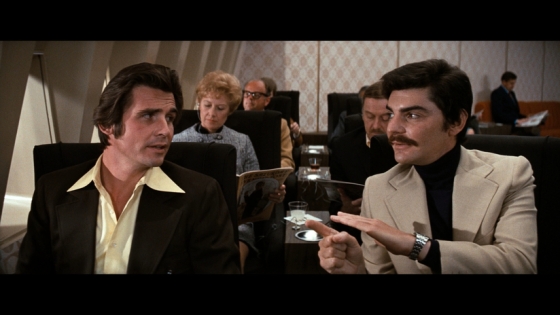
Richard
Benjamin and James Brolin are Peter Martin and John Blane, two affluent
businessmen on a vacation designed to get Benjamin's character over a
recent nasty divorce. John has visited Westworld before and Brolin
plays the opening sections of the film as an experienced visitor amused
at his friends enthusiasm and his other various trip anxieties. Peter is
the naive, gee whiz neophyte who wants to enjoy all the parks amenities
but is a little concerned about potential embarrassment and danger.
Delos is able to provide such adult fantasy play by loading it's parks
with the latest technology, lifelike robots that are fully functional in
all the important ways. The promise is that the fantasy is 100% safe.
Famous last words.
Michael Crichton, the writer/director of
Westworld, was a well known novelist making his directorial debut. He
had written other highly entertaining films before this, including the
Science Fiction technology thriller "The Andromeda Strain". His milieu
was technology and many of his well known books feature stories of
technology going wrong; "Sphere", "The Terminal Man","Congo". The most
successful movie made from one of his stories is "
Jurassic Park"
about an amusement park where science is not able to control it's
attractions. Basically, "Jurassic Park" is "Westworld" with dinosaurs.
Everybody probably remembers that great line from Jeff Goldblum's Ian
Malcom, "Yeah, but, John, if The Pirates of the Caribbean breaks down,
the pirates don't eat the tourists". It was actually the second time
such a concept was used by him. Reportedly, Crichton was inspired to
write "Westworld" after a visit to Disneyland where he was impressed by
the animatronics in "Pirates of the Caribbean".
The movie would be
a voyeuristic dud if they had stuck to the simple premise of the park.
In order to create suspense and thrills, the rules of the park will
breakdown as the technology does. As a result, that which is supposed to
be a naughty rich man's fantasy turns into his nightmare. The
explanation for how things start to go wrong sounds suspiciously like a
computer virus; which at that point had not really been thought of. So
Crichton's work is oddly prescient, although his film language was a
little bit crude. In the early part of his career, the film stories
often feel a bit clumsy as they try to bring to life a great idea.
"Coma" and "Looker" are two other examples of this failing. They each
have solid premises but hit some bumps along the way. If you thought it
was weirdly convenient that all the technicians were off the island in "
Jurassic Park", you will notice how it is even more awkward the way the employees at Delos are handled in the story.
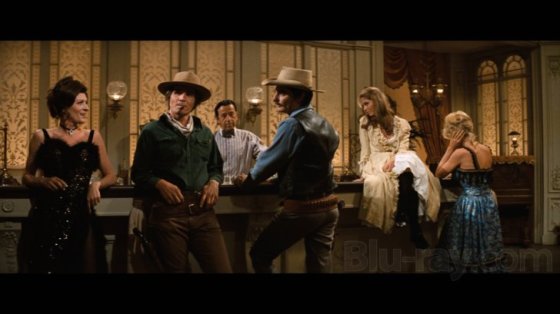
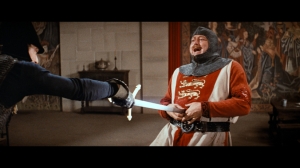
Peter
and John engage in the fantasy play that they paid for. The have a bar
fight, spend the night with the ladies of the bordello where they are
staying, they even get to do a jailbreak. On multiple occasions they
face down the gunslinger character that is their nemesis. The first of
those events comes in a traditional barroom standoff. It makes perfect
sense. The second confrontation is more visually interesting but it is
largely unexplained. The point is that Brolin and Benjamin begin to take
their conflicts and the outcomes for granted. There are
however some warning signs that foreshadow their danger. In a parallel
story set in the Medieval section of the park, a lecherous customer
also sees some faults in the system. His animatronic paramour actually
rejects him which goes against all the fantasy he is paying for. When
Mel Brooks said "it's good to be the king" he had apparently not visited
Delos Medieval World before.
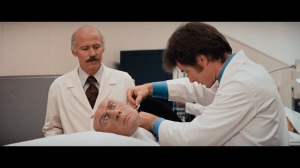
It takes an hour of the near ninety
minute running time to get to the real drama of the story. As everything
is being set up we get a backstage view of the technology and some of
the problems that the administrators faced. Like John Hammond twenty
years later, they are convinced that they can manage their dream despite
the overwhelming technology challenges they face.
This is another place where the story telling has to rely on less than
smooth technique from the first time director. The guys in lab coats
talk out problems instead of visualizing them. The futuristic aspects of
the park come down to long hallways filled with inadequate lighting.
There are only a couple of moments where we see the robots in their true
form as they are being repaired. These moments are handled well on a
limited budget but they feel somewhat stilted.
Westworld is a simple story that is told in a basic, sometimes crude manner. It was successful enough to have a sequel, "
Futureworld"
where the plot is more intricate and the acting and motivation a lot
more polished. So if the film is not a masterpiece of cinema technique,
why is it a film I want you to see? Well I have already mentioned the
story line is the crib sheet for the more successful "Jurassic Park".
There is however a second feature that portends future science fiction
lexicon; the unstoppable killing machine. It can't be argued with, it
can't be bargained with and it will not stop until you are dead. Yul
Bryner plays a variation of his "Magnificent Seven" character here. The
foreboding shootist with few words all dressed in black.
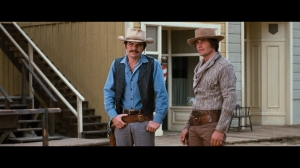
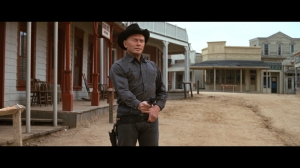
As
our city slickers once again confront the tin target set up for them to
take down, the outcome changes. This is when the movie basically
becomes "The Terminator" for the last twenty minutes. Just as Sarah
Conner learned, a robot is never finished when you want it to be, our
hero struggles repeatedly to finish off and outwit the mechanical man
pursuing him. Eleven years before Arnold Schwarzenegger donned the black
leather, unholstered his weapon, and chased down his prey, Crichton had
his mechanical harbinger of doom do the same thing in almost exactly the
same manner. When you watch the machine like swagger of the gunfighter,
it is easy to see the future Terminator walking relentlessly toward us.
There is an early computerized point of view shot from the gunfighter
that consists of heat signatures and fuzzy pixels. Both of these ideas
will be used in future films featuring robots or aliens tracking down
their targets.
You should find it easy to ignore the plot
loopholes on park safety and the scarcity of assistance toward the end
because you will identify with the customers. They came for a good time
and they are getting so much more than they bargained for. This film
will find ways to give you your monies worth even when it frustrates you
with amateur film mistakes. The story concept and the vision of the
wild west as a robot will echo forward to better films that are all well
loved by the movie audience, but those films owe a huge debt to
Westworld.
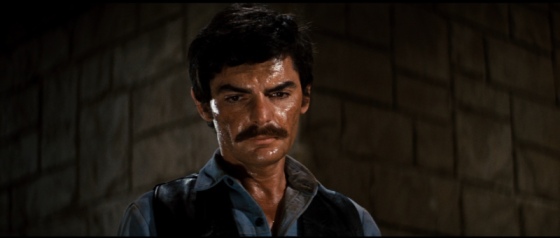
Richard
Kirkham is a lifelong movie enthusiast from Southern California. While
embracing all genres of film making, he is especially moved to write
about and share his memories of movies from his formative years, the
glorious 1970s. His personal blog, featuring current film reviews as
well as his Summers of the 1970s movie project, can be found at
Kirkham A Movie A Day.
 "Everything is Awesome" gets recycled in the film pretty effectively with a twist that might be a little too obvious, but there are two or three more musical spots that work even better. In particular, "Gotham City Guys" should have you laughing out loud. It's a great mix of visual bits and the lyrics will crack you up. Also, "Not Evil" plays as an insincere denial of intent because of the context, but at the end of the movie it really fits in well with the theme that the story supports. Will Farrell has one nearly static scene and then is only heard from again as an off camera voice. Instead Maya Rudolph steps in as the human adult that hovers over the events in the story. In my mind, that is an improvement.
"Everything is Awesome" gets recycled in the film pretty effectively with a twist that might be a little too obvious, but there are two or three more musical spots that work even better. In particular, "Gotham City Guys" should have you laughing out loud. It's a great mix of visual bits and the lyrics will crack you up. Also, "Not Evil" plays as an insincere denial of intent because of the context, but at the end of the movie it really fits in well with the theme that the story supports. Will Farrell has one nearly static scene and then is only heard from again as an off camera voice. Instead Maya Rudolph steps in as the human adult that hovers over the events in the story. In my mind, that is an improvement.









